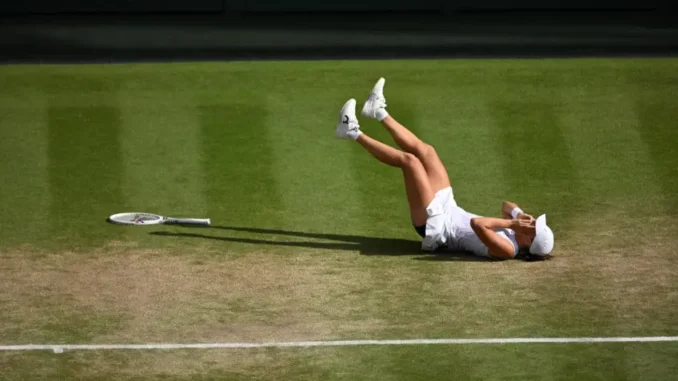
On a sun-drenched afternoon at the All England Club on July 12, 2025, Iga Swiatek etched her name into tennis history with a performance that left spectators in awe and her opponent, Amanda Anisimova, searching for answers. The 24-year-old Polish superstar delivered a ruthless 6-0, 6-0 victory in the Wimbledon women’s singles final, securing her first title on the hallowed grass courts and her sixth Grand Slam crown overall. In just 57 minutes, Swiatek produced the first double bagel in a Wimbledon final since 1911, a feat that underscored her dominance and revived her reputation as the WTA’s premier big-match player. Her performance, dubbed by fans as another opening of “Iga’s Bakery,” sent a resounding message: Swiatek is a force on every surface.
From the moment she stepped onto Centre Court, Swiatek was a vision of focus, her white headphones signaling her readiness to tune out distractions and orchestrate a masterclass. The match began with Anisimova, a 23-year-old American in her first Grand Slam final, struggling under the weight of the occasion. A tame forehand into the net handed Swiatek an immediate break, and the Pole never relented. With relentless returning, pinpoint accuracy, and a staggering 78% first-serve percentage, Swiatek smothered Anisimova, who committed 28 unforced errors. “She came out playing very, very well,” Anisimova graciously acknowledged post-match. “So all the credit to her. She was able to really play the game she wanted. … From my side, I think I was a bit frozen there with my nerves.” Swiatek, by contrast, was unflappable, winning 55 points to Anisimova’s 24 and needing just 10 winners to seal the victory.
Swiatek’s triumph was not just a win but a historic milestone. She became the first Polish player to claim Wimbledon’s singles title in the Open Era, joining an elite group of women who have won majors on clay, hard, and grass surfaces. Her flawless 6-0 record in Grand Slam finals ties her with Monica Seles for the longest such streak to start a career in the Open Era, a testament to her mental fortitude. “It seems super surreal,” Swiatek admitted, her voice tinged with disbelief. “I didn’t even dream, because for me it was just too far. I feel like I’m an experienced player after winning slams before, but I never expected this one.” Her victory also marked her 100th major match win in just 120 matches, a pace surpassed only by Serena Williams among women in recent history.
The road to this triumph was not without its challenges. After dominating the WTA with four French Open titles and a US Open crown, Swiatek faced a tough 2025 season, including a semifinal upset by Aryna Sabalenka at Roland Garros and a loss to Jessica Pegula in the Bad Homburg Open final. Seeded eighth at Wimbledon, she had never advanced past the quarterfinals on grass, making her run to the final all the more remarkable. “I was really competing throughout the whole two weeks no matter what happened before the season,” Swiatek told reporters, crediting her trust in the process. Her semifinal demolition of Belinda Bencic (6-2, 6-0) and the final’s double bagel showcased her ability to peak when it matters most.
Swiatek’s “bakery” nickname, born from her penchant for 6-0 sets (bagels) and 6-1 sets (breadsticks), was on full display. Her 32 bagel sets in majors rank third among active players, and this was her third double bagel in a Grand Slam, following similar routs at the 2023 and 2024 French Opens. “My team believed in me more than I did,” she said, thanking her coach for navigating the season’s ups and downs. The victory, her 23rd tour-level title, propelled her to World No. 3, narrowing the gap with top-ranked Sabalenka and Coco Gauff.
For Anisimova, the final was a harsh lesson but a stepping stone. Her semifinal upset over Sabalenka marked a career highlight, and her run to the final will see her enter the WTA Top 10. “You’re such an inspiration to me, an unbelievable athlete,” she told Swiatek, her voice breaking as she thanked the crowd for their support. Despite the loss, Anisimova’s resilience shone through, a reminder of her potential after a mental health break in 2023.
As Swiatek hoisted the Venus Rosewater Dish, presented by Kate, the Princess of Wales, she stood as the eighth consecutive first-time women’s champion at Wimbledon. Yet her performance—only the second double bagel in a women’s Grand Slam final in the Open Era, matching Steffi Graf’s 1988 French Open rout—set her apart. With the US Open looming, where she aims for a seventh major, Swiatek’s Wimbledon triumph signals that her bakery is open for business, and the tennis world is eagerly awaiting her next serving.
Leave a Reply